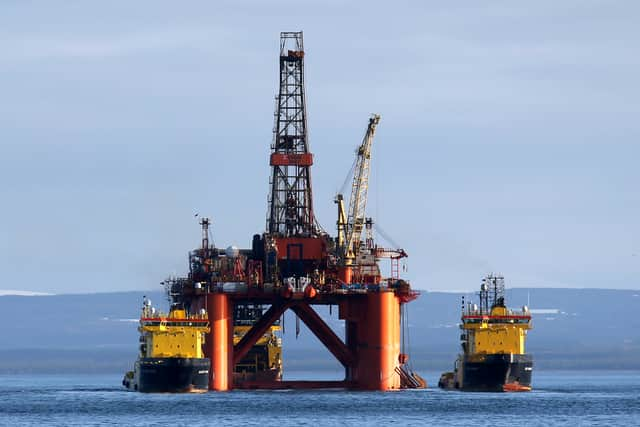North Sea oil: Climate campaigners condemn government as it grants 24 new oil and gas licences
and live on Freeview channel 276
The UK’s oil and gas regulator has awarded 24 new fossil fuel exploration licences - right on the tail of announcing a host of nature-positive initiatives for the North Sea.
The new licences are part of the second tranche of the North Sea Transition Authority’s (NSTA) 33rd licensing round, and follow 27 licences granted in October last year. British multinationals Shell and BP are among the 17 companies which received licences in this latest round, with more expected to be confirmed in the coming months.
Advertisement
Hide AdAdvertisement
Hide AdClimate campaigners have been quick to condemn the new licences, which came within a day of the government announcing a host of positive environmental measures for the North Sea - including a ban on controversial sandeel fishing, and protecting new areas from bottom trawling. It also came as oil giant shell announced profits of £22.4 billion for 2023.


However, the government maintains the new licences are an important part of the UK's energy transition, and supporting an economically significant industry. “This latest batch brings total offers so far to 51, with more to come once the appropriate environmental checks are complete," an NSTA spokesperson told PA. “These licences have the potential to make a significant contribution to the UK in energy production and economic benefits, and the NSTA will work alongside the licensees to help bring them into production as quickly as possible.”
Minister for Energy Security and Net Zero Graham Stuart added: “We will continue to need oil and gas over the coming decades, so it is common sense to make the most of our own resources – with domestically produced gas almost four times cleaner than importing liquefied natural gas from abroad. These new licences will strengthen our energy security now and into the future, while also helping boost our economy, by backing an industry that supports 200,000 jobs and is worth £16 billion each year.”
But Friends of the Earth Scotland’s climate campaigner, Alex Lee, said plans for new oil and gas were slowing down the transition to renewables, by diverting time and resources from where it is needed. "All credible climate science says that we must urgently stop burning the oil and gas that is choking our planet."
Advertisement
Hide AdAdvertisement
Hide AdShe added: "Workers need a real transition plan that can help them shift to secure green jobs, not political stunts that aim to further lock households into a fossil fuel system that is failing to provide either security and affordability."
Greenpeace UK campaigner Philip Evans said the new licences showed that the government "still has its fingers in its ears". He continued: "The government knows that the fossil fuel industry is driving the climate crisis, but instead of cracking down on oil and gas giants like Shell, they’re greenlighting a new drilling frenzy in the North Sea. This will do nothing to lower bills or increase our energy security, but will cause further climate chaos around the world."
“The climate crisis is accelerating dramatically - and those who’ve done the least to cause the crisis are paying the highest price," he said. "We urgently need our leaders to stop siding with the oil and gas giants and force them to stop drilling for new fossil fuels, and start paying for the damage they are causing to people and planet.”
Last year was also the hottest ever recorded, with the highest average temperature worldwide. However, experts are already warning that 2024 might break that record.
Scientists have been urging the global community to radically cut fossil fuel emissions to prevent further warming, with each fraction of a degree further destabilising the Earth’s climate.
Comment Guidelines
National World encourages reader discussion on our stories. User feedback, insights and back-and-forth exchanges add a rich layer of context to reporting. Please review our Community Guidelines before commenting.
